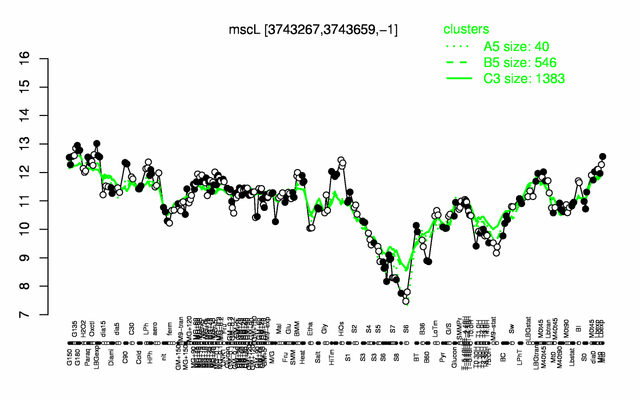Difference between revisions of "MscL"
| Line 24: | Line 24: | ||
|style="background:#ABCDEF;" align="center"|'''Immediate neighbours''' || ''[[ywpD]]'', ''[[ywpB]]'' | |style="background:#ABCDEF;" align="center"|'''Immediate neighbours''' || ''[[ywpD]]'', ''[[ywpB]]'' | ||
|- | |- | ||
| − | |style="background:#FAF8CC;" align="center"|'''Sequences'''||[http://bsubcyc.org/BSUB/sequence-aa?type=GENE&object=BSU36360 Protein] [http://bsubcyc.org/BSUB/sequence?type=GENE&object=BSU36360 DNA] [http://bsubcyc.org/BSUB/seq-selector?chromosome=CHROM-1&object=BSU36360 | + | |style="background:#FAF8CC;" align="center"|'''Sequences'''||[http://bsubcyc.org/BSUB/sequence-aa?type=GENE&object=BSU36360 Protein] [http://bsubcyc.org/BSUB/sequence?type=GENE&object=BSU36360 DNA] [http://bsubcyc.org/BSUB/seq-selector?chromosome=CHROM-1&object=BSU36360 DNA_with_flanks] |
|- | |- | ||
|colspan="2" | '''Genetic context''' <br/> [[Image:mscL_context.gif]] | |colspan="2" | '''Genetic context''' <br/> [[Image:mscL_context.gif]] | ||
Revision as of 11:28, 14 May 2013
- Description: large conductance mechanosensitive channel protein, prevents selective release of cytoplasmic proteins in a hypotonic environment
| Gene name | mscL |
| Synonyms | ywpC |
| Essential | no |
| Product | large conductance mechanosensitive channel protein |
| Function | resistance to osmotic downshockglycine betaine export |
| Gene expression levels in SubtiExpress: mscL | |
| Metabolic function and regulation of this protein in SubtiPathways: Stress | |
| MW, pI | 14 kDa, 4.649 |
| Gene length, protein length | 390 bp, 130 aa |
| Immediate neighbours | ywpD, ywpB |
| Sequences | Protein DNA DNA_with_flanks |
Genetic context 
This image was kindly provided by SubtiList
| |
Expression at a glance PubMed
| |
Contents
Categories containing this gene/protein
coping with hypo-osmotic stress, membrane proteins
This gene is a member of the following regulons
The gene
Basic information
- Locus tag: BSU36360
Phenotypes of a mutant
sensitive to osmotic downshock (> 0.5 M) during logarithmic growth PubMed
Database entries
- DBTBS entry: [1]
- SubtiList entry: [2]
Additional information
The protein
Basic information/ Evolution
- Catalyzed reaction/ biological activity:
- Protein family: mscL family (according to Swiss-Prot)
- Paralogous protein(s):
Extended information on the protein
- Kinetic information:
- Domains:
- Modification:
- Cofactor(s):
- Effectors of protein activity:
- Localization: cell membrane PubMed
Database entries
- UniProt: P94585
- KEGG entry: [3]
- E.C. number:
Additional information
Expression and regulation
- Operon: mscL PubMed
- Sigma factor:
- Regulation: expressed in logarithmic phase PubMed
- Regulatory mechanism:
- Additional information:
Biological materials
- Expression vector:
- lacZ fusion:
- GFP fusion:
- two-hybrid system:
- Antibody:
Labs working on this gene/protein
Jan Maarten van Dijl, Groningen, Netherlands
Erhard Bremer, University of Marburg, Germany homepage
Your additional remarks
References
Reviews
Original Publications